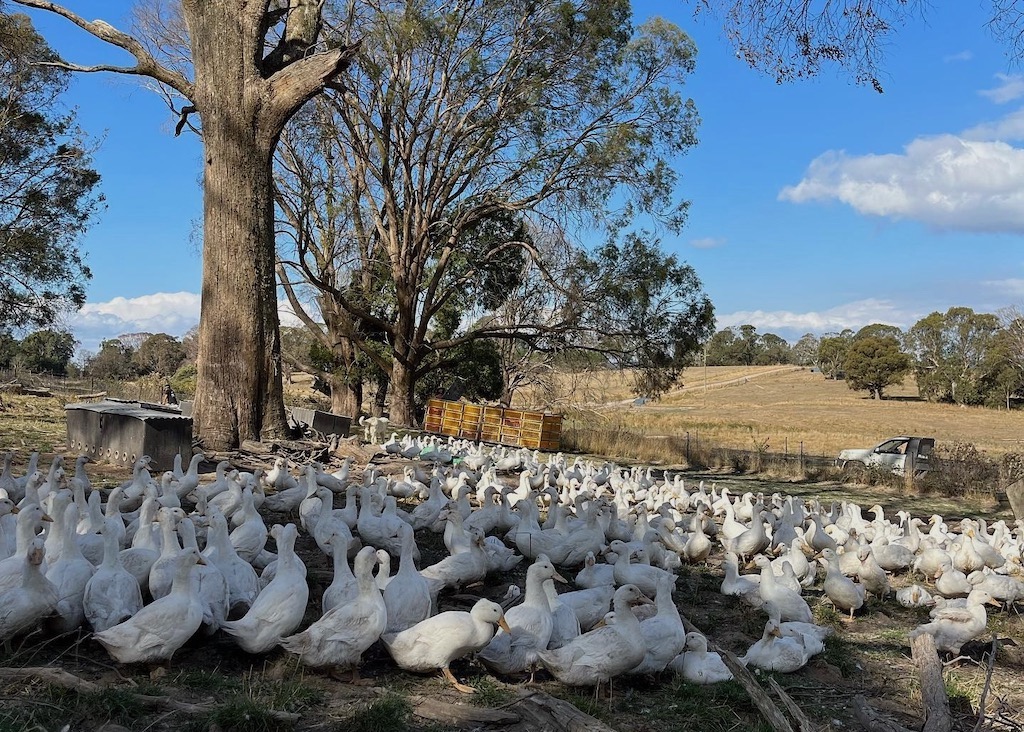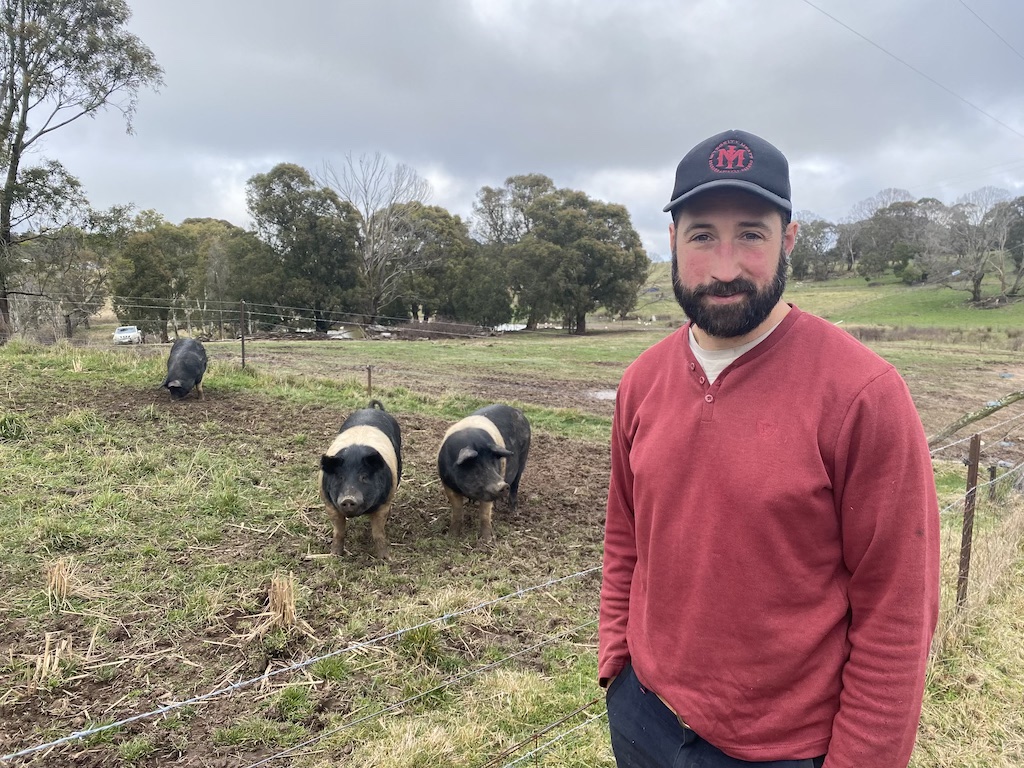
Free-range ducks approaching the size at which they are killed and dressed, ready for Sydney’s hatted restaurants. Photo: Tathra Place Free Range.
Supplying upmarket restaurants in Sydney with about 1000 ducks each week, Taralga free-range farmers Luke and Pia Winder are gearing up for more growth and diversification.
Since buying their 100-acre (40-hectare) property, Tathra Place Free Range, just north of Taralga in 2015, they have been growing out ducks and raising free-range pigs, cattle and sheep. They have opened the Integrity Meats butcher’s shop in North Goulburn and are planning to open a second butcher’s shop in Belconnen in the ACT in December.
Their enterprise is turning over about $1.8 million annually and building to a staff of 20.
Recently, Luke left Australia for a tour of America to research farming techniques before developing his free-range operation.
“Most of the producers at the top of the regenerative or natural sequence farming – the ‘godfathers and GOATS’ – are in the United States,” Luke said. “So I’m going to meet a lot of these guys, really fantastic hog producers.
”If the Australian Government gets on board and gives us permission, we will bring in some embryos, because we are desperate for new heritage pig bloodlines in this country.”
Luke plans to visit Dallas in Texas, Atlanta, Bluffton in Georgia, North and South Carolina, and Virginia. His inspiration for leaving his job as an electrician in Sydney comes from Virginia farmer Joel Salatin, who sells his produce directly to consumers and rotates his stock in an ecological system.
Luke began with 200 hens, selling their eggs directly to Sydney customers and making $1200 a week, but soon realised it was a hard way of making a living.
He bought some pigs, began his own farmers’ market and decided he could make a living.
“We loved coming out [from Sydney]. We had two boys at the time and it snowballed from there,” he said.
He came to his new life on the land with some practical skills including knowing how to weld, working with plumbers and as an electrician, but it was his selling skills that proved pivotal.
These he had gained years earlier while running a car accessories shop in Sydney with his brother-in-law Paolo Villanueva, who taught him how to sell.
That was far easier, however, than pitching his home-grown produce to the discerning chefs at Sydney’s best restaurant.
“Getting some of these chefs to give you even five seconds in an elevator is near impossible,” he said. “When you do get 15-20 seconds of their time, you have to hit a home run.”

Luke Winder with some of his Hampshire Duroc-cross pigs, which deliver two litters of piglets a year. In conventional piggeries, sows often deliver three litters a year. Photo: John Thistleton.
The first big-name chef he landed was Peter Gilmore, who came out to Taralga to see for himself Tathra Place’s operation.
”We put on a long lunch for him in the paddock with the ducks,” Luke said.
They began supplying ducks for Quay and Benelong restaurants.
“Once someone like Peter Gilmore is championing your brand, it spreads like wildfire,” he said.
Luke said Matt Moran, an executive chef at a group of restaurants, was still taking his ducks, after several years.
“I think there is an expectation if you are going into a restaurant to spend $300 or $400 just on food, you are not going to get a barn-raised duck or factory-farmed chicken,” he said. “They are committed to finding produce like mine.”
Today, Luke is running up to 7000 free-range ducks, guarded from predators by 19 Maremma dogs.
“We grow them out to either six or seven weeks and there are about 1000 in a batch [going to Sydney],” he said. “That goes up and down, as we literally grow to order, and we have been as high as 1300 a week.”
His pigs, sheep and cattle are killed at Western Sydney Meatworks at Picton, while chickens and ducks are killed at Tennyson, near Kurrajong.
The Winders’ three sons, Johnathon, 6, Michael, 10, and Tommy, 14, all help, along with their staff.
“Michael loves being in the shop actually helping, and Tommy can do anything now, drive all the equipment, he is almost as good as a staff member out here,” Luke said.
Moving the animals all the time mimics what is happening in nature, Luke says. On the farm, they are kept together by fences and move from one paddock to another. Chickens keep the fly count down, and the animals continue to cycle around the property like a delicate ballet.
Original Article published by John Thistleton on About Regional.












